The Pleasures of the Analog life
Thoughts on leading a life with analog tools and digital minimalism
I am not going to lie. Writing newsletters is much harder than I thought. Therefore, I have decided on a bi-weekly drop instead of a weekly issue as it better aligns with my goals of creating quality content over quantity. Plus I want to make sure I am having fun with this. Anyway on to today’s issue!
Disclaimer : Bird Droppings does not pretend to be an expert in any of the topics mentioned below (except for somethings). Past performance is not indicative of future results. Bird Droppings does not take responsibility of any positive/negative side effects that may arise from the overload of positive creative inspiration below.
Consume at your own risk.
Lately I have been thinking about analog tools and processes, perhaps due to the unique juxtaposition of advancing technology and traditional tools and process we continue to use today. On one end of the spectrum, we see artificial intelligence advancing its reach into all aspects of our lives. On the other end, we see an increased interest in analog tools, handmade things, journals, and experiences that allow us to ‘fully’ feel ‘human’. What might be this conundrum?
People seem to relish solid traditional objects to make sense of a complex and difficult world. The sophistication of digital experiences leave us craving for the haptic nature of physical ones. There is something calming about claiming the simple pleasures in life. Feeling the scratch of a pencil lead on paper, staring into the blazing flames of a campfire, watching a stew bubble in cooking pot - there is a contentment to performing these activities with time and attention.
However, when was the last time we had the time to do these things for ourselves? But that’s when I realized - perhaps, it is not about time. Perhaps, we have forgotten that way of life.
“Beware the barrenness of a busy life.” —Socrates
This interesting article from Maria Poppova discusses what the author George Dyson explores in his book Analogia. Here is a quote that I liked from the article :
There are four epochs, so far, in the entangled destinies of nature, human beings, and machines. In the first, preindustrial epoch, technology was limited to the tools and structures that humans could create with their own hands. Nature remained in control.
In the second, industrial epoch, machines were introduced, starting with simple machine tools, that could reproduce other machines. Nature began falling under mechanical control.
In the third epoch, digital codes, starting with punched cards and paper tape, began making copies of themselves. Powers of self-replication and self-reproduction that had so far been the preserve of biology were taken up by machines. Nature seemed to be relinquishing control. Late in this third epoch, the proliferation of networked devices, populated by metazoan codes, took a different turn.
In the fourth epoch, so gradually that almost no one noticed, machines began taking the side of nature, and nature began taking the side of machines. Humans were still in the loop but no longer in control. Faced with a growing sense of this loss of agency, people began to blame “the algorithm,” or those who controlled “the algorithm,” failing to realize there no longer was any identifiable algorithm at the helm. The day of the algorithm was over. The future belonged to something else.
A belief that artificial intelligence can be programmed to do our bidding may turn out to be as unfounded as a belief that certain people could speak to God, or that certain other people were born as slaves. The fourth epoch is returning us to the spirit-laden landscape of the first: a world where humans coexist with technologies they no longer control or fully understand. This is where the human mind took form. We grew up, as a species, surrounded by mind and intelligence everywhere we looked. Since the dawn of technology, we were on speaking terms with our tools. Intelligence in the cloud is nothing new. To adjust to life in the fourth epoch, it helps to look back to the first.
Dyson explores the possibility that we are in an era that we can no longer control, that we co-exist with technology we no longer fully understand. To be able to understand this present era, it might be beneficial to look back to the past.
I found this to be an interesting topic to muse over - to try and understand what our species is collectively trying to achieve and how that individually impacts us. Personally, my daily life is one of the areas in which I see the effects of constant use of technology most evidently.
In his book Digital Minimalism, Cal Newport talks about how the human brain is not wired to be constantly using technology. He explains how our brain feels better when we ‘fix’ a broken window or ‘make’ an origami paper plane. From this particular article, (which I highly encourage you check out) he also mentions how (physical)activity makes the human brain feel better. These are the two points that stood out the most to me.
Many of the best uses of the online world support better living offline. We’re not evolved for digital life, which is why binges of online activities often leave us in a confused state of strung out exhaustion. This explains why many of the highest return online activities are those that take advantage of the Internet to improve important aspects of your offline life.
Activity trumps passivity. Humans, deep down, are craftsmen. We find great satisfaction in creating something valuable that didn’t exist before. Some of the most fulfilling online activities, therefore, are those that involve you creating things, as oppose to simply consuming.
This might explain why there is an entire industry of board games that have gained popularity among those who are constantly tied to their desks in front of their computers. It feels good to solve problems in an analog way - away from the screen, by touching cards, rolling dice, making conversation and socializing. This reduces stress levels, releases dopamine and in general decreases anxiety. Removing these physical experiences messes with our mind. We are anxious and tired - as a generation.
Newport also mention something really important that I would like to emphasize - this is NOT to say that technology is to be rejected. It is to simply reconsider the possibility of new tools and activities (or should I say old tools and activities) that got replaced. It is a nudge to simply rethink the analog experiences that we have replaced with digital ones and carefully consider if it is serving us or hurting us.
One good rule of thumb he mentions is - Stay wary of technology that did not solve a problem that didn’t need solving. (For example : Snapchat). These products were likely created to support ad sales by fostering additive behavior.
I felt lucky when I started my career as a designer. I got to do something I loved everyday and get paid for it. Working on the computer was my primarily job as I am an illustrator/graphic designer. I was glad to do this for a couple of years - I got to design stuff all day after all.
After a couple of years however, I started noticing that I felt out of touch with myself. I was creating everyday but somehow it felt like I was missing something. I remember bringing a sketchbook to work everyday to doodle in during breaks and after hours. It felt oddly relieving to hold a pencil, to feel the texture of the paper, to flip back the pages and see what I drew the week before. It also felt nice to see the smudges and the mistakes, the strikes, the oddly shaped lines in the absence of the Cmd/Control Z button. It was a representation of my honest unfiltered creative self. In the sketchbook pages below, it is easy to see how my confidence and style evolved over time.

From then on, I am a huge proponent of keeping a sketchbook or a notebook (for those who don’t draw). Why? Because :
Analog experience : It gives you the opportunity to have a haptic, wholesome, away-from-the-screen experience ; to feel a pen and a paper. If you have not written in a long time, you’ll notice how wonky your hands will feel holding a pen again.
It’s one of the best ways to jot down thoughts and ideas. Yes, you can do this on your computer too but there are somethings that are advantageous about a notebook.
Limited space: You can’t create a 100 point to-do list. After a while you’ll notice how ridiculously ambitious the list is looking and you’ll start prioritizing in a much more efficient way. (Ask me how I know).
Memory Retention : For some reason, ideas written down in the computer get forgotten (at least for me). The format of a notebook allows me to flip back to my ideas and re-read them again and again. I can re-assess my ideas and decide on which ones may be worth re-visiting. If I type it down in a computer application, I never look back at it. Why? I don’t know. Maybe I like flipping pages or something. Point is - Your notebooks induce curiosity - if you have a small notebook in your hand, you instinctively flip through it. I believe this makes revisiting notes more probable.
Portability: A pocket notebook can be taken anywhere and everywhere, a computer/laptop can’t. A phone can but see point above.
It’s fun: It’s fun to flip back or revisit your old notebooks - it will make you remember the time you wrote down stuff and the associated memories of that time in your life.
Overtime, I have mastered the art of keeping multiple notebooks and different curated kits to go with it and can vouch for how useful they have been for me. Which brings me to….
A Prompt : Keep a pocket notebook for 1 week
Materials needed : A pocket book (any brand, any type, any color), a pen/pencil
What to do : Write something/literally anything - one word/one sentence/a paragraph/ten pages/whatever you want, every day for seven day. DO NOT FORGET TO DATE IT.
On day 7, try to remember what you wrote on the first day. If you don’t, that’s okay, I don’t think most people do. You can flip, go on.
Ideas on what to write :
What you ate
How you feel (simple words like angry/tired/happy/even ‘ugh’ qualifies)
What you saw outside your window
The weather
One thing that made you happy
One thing that made you annoyed
List of people you secretly want to punch
You get the idea. It can be anything. NOTE : It does not have to be a profound reflection of the meaning of life.
I think it’s a fun little exercise for everyone to try. You’ll be surprised how bad your memory is. And also how much you enjoy looking at what you wrote for the past seven days. Please, please, PLEASE share photos if you do end up doing this! Here are some peaks at my pocket book notes for inspiration!
This is a reminder for me and for everyone! Not everything/anything in your book needs to be a work of art - your pocketbook is yours to use as a tool to organize you brain. Since everyone’s brain is different, there is no ‘right’ way to use a book.
Alright, that’s it for today! Thank you for reading!
Next week - I will share a curated kit I made for a special project I am working on. Like I mentioned in this post about kits, least points of resistance is the easiest way to get things done for me - so I made this kit to have all my tools ready to use for this specific project, curated in one place.
Here’s a sneak peak!
I can’t wait to do a detailed run through next week where I will share my process and what’s inside the kit!
Stay tuned! Okay bye!
OH OH! If you have not already, go ahead and click the red button below to get bird droppings every other week delivered straight to your inbox!



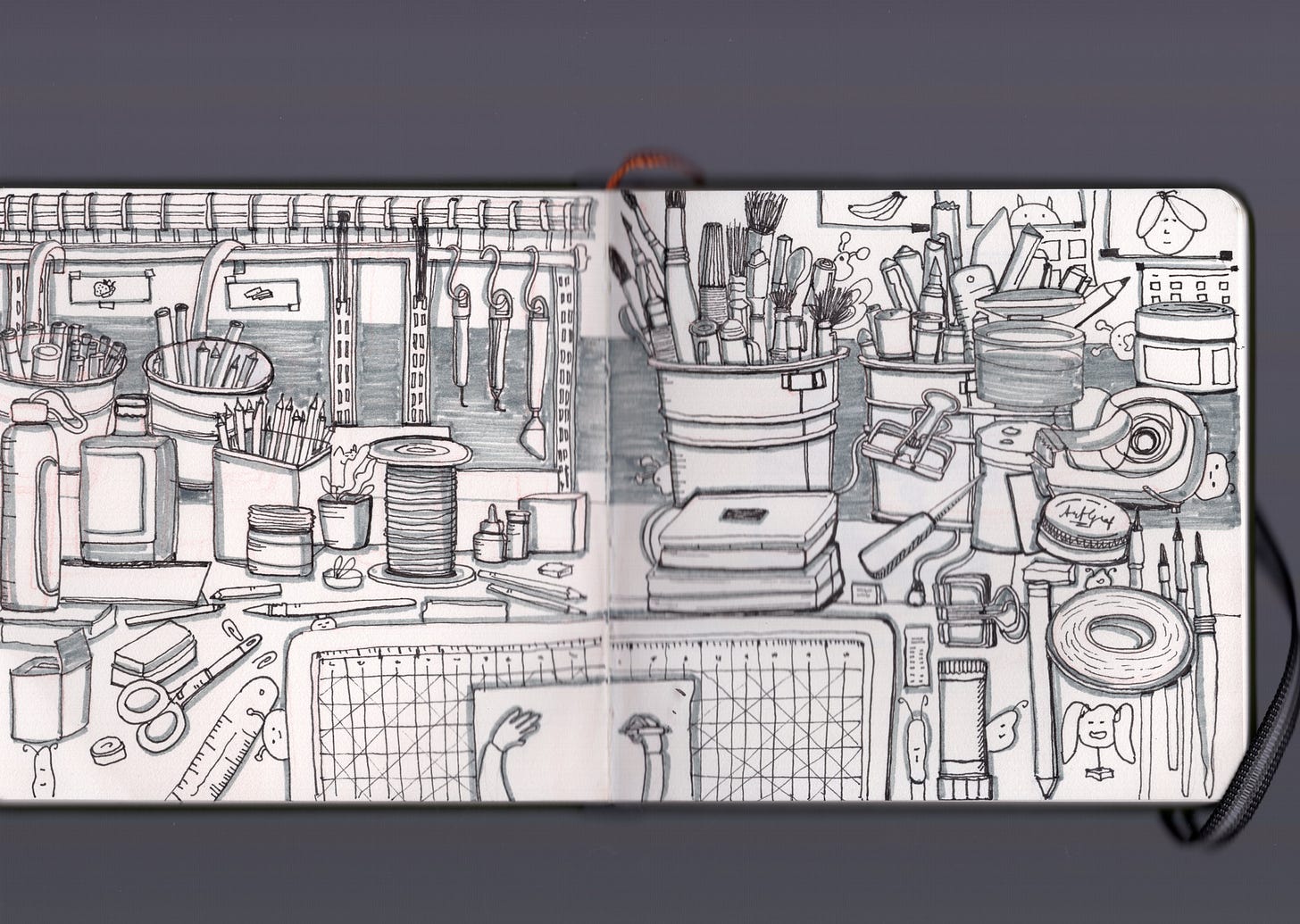


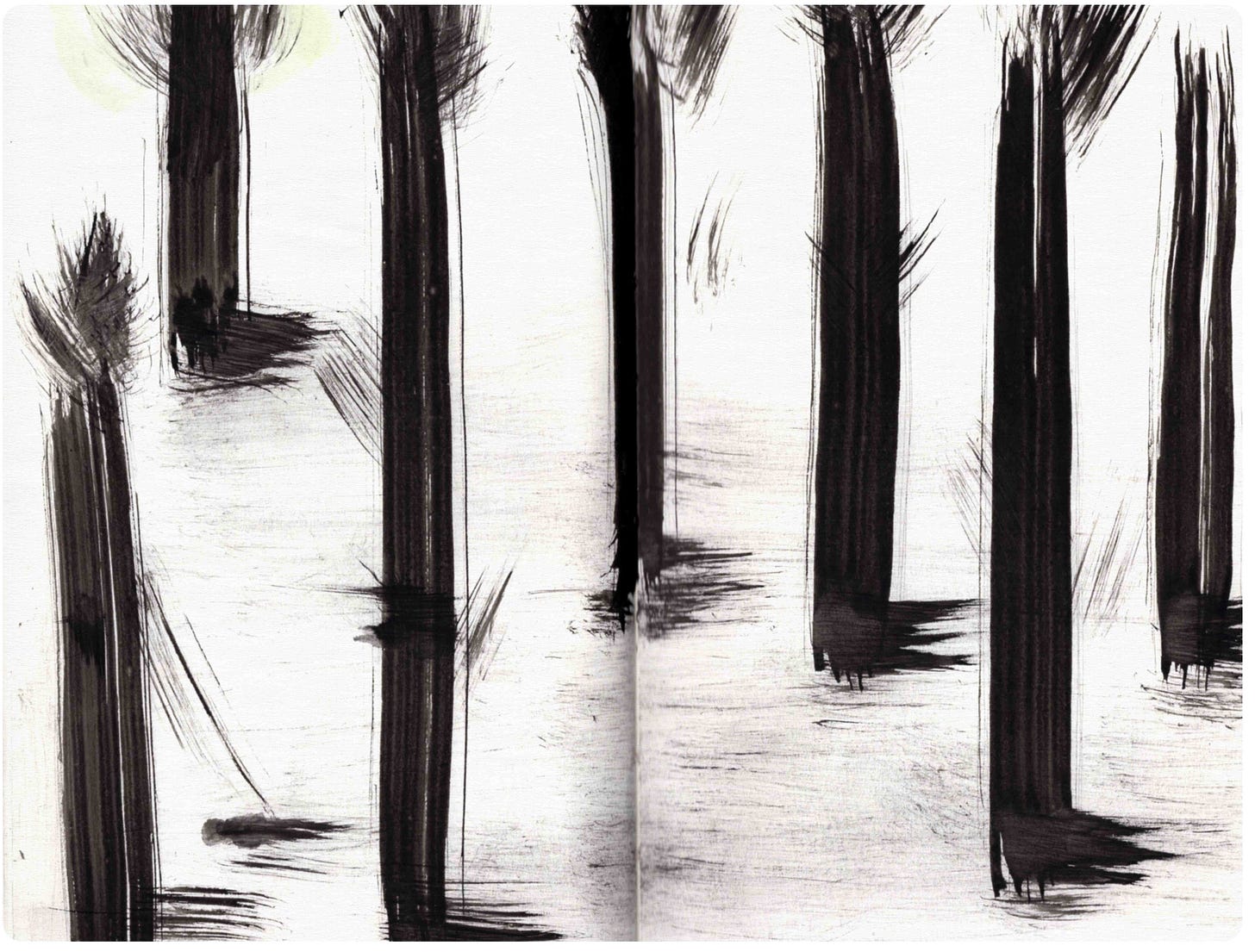
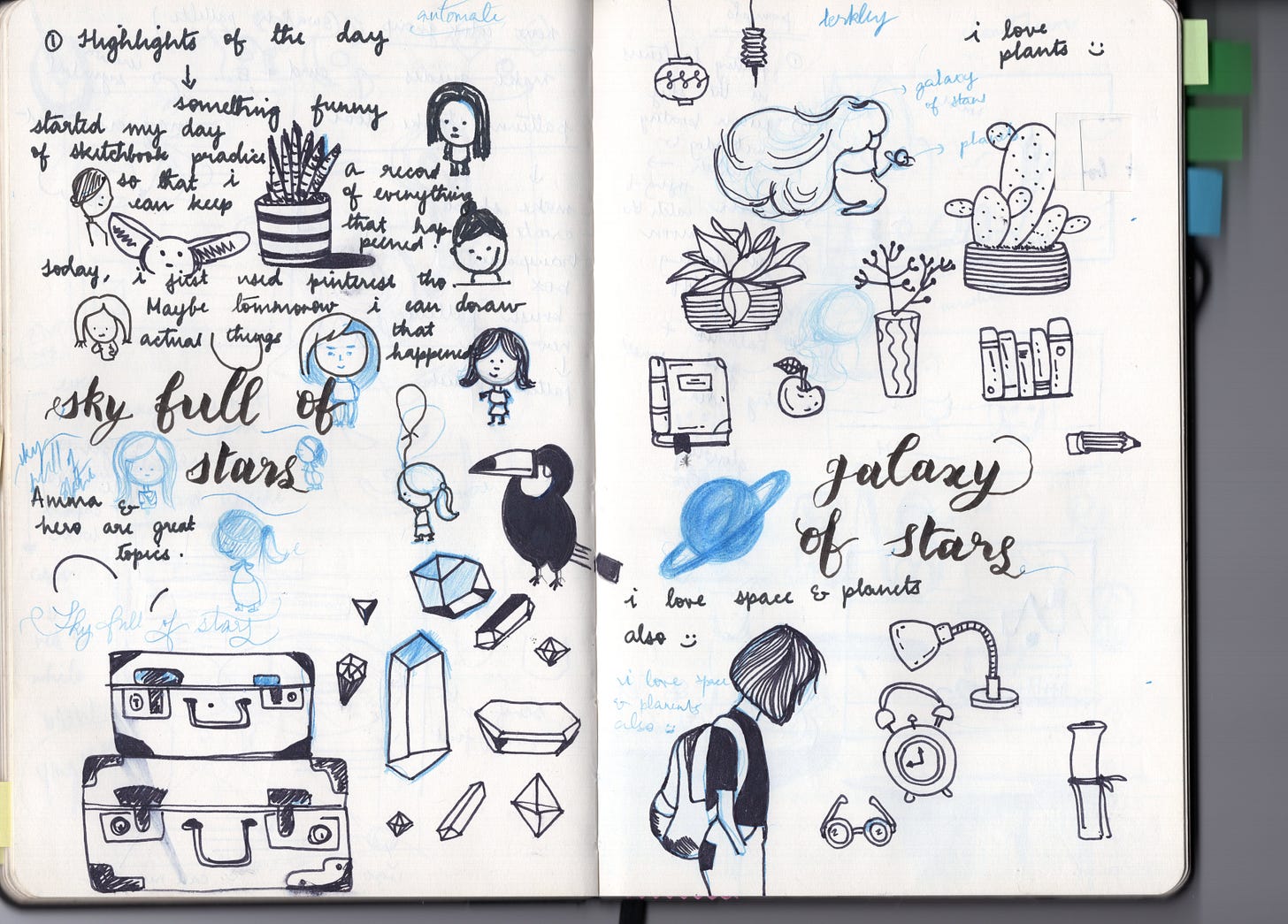
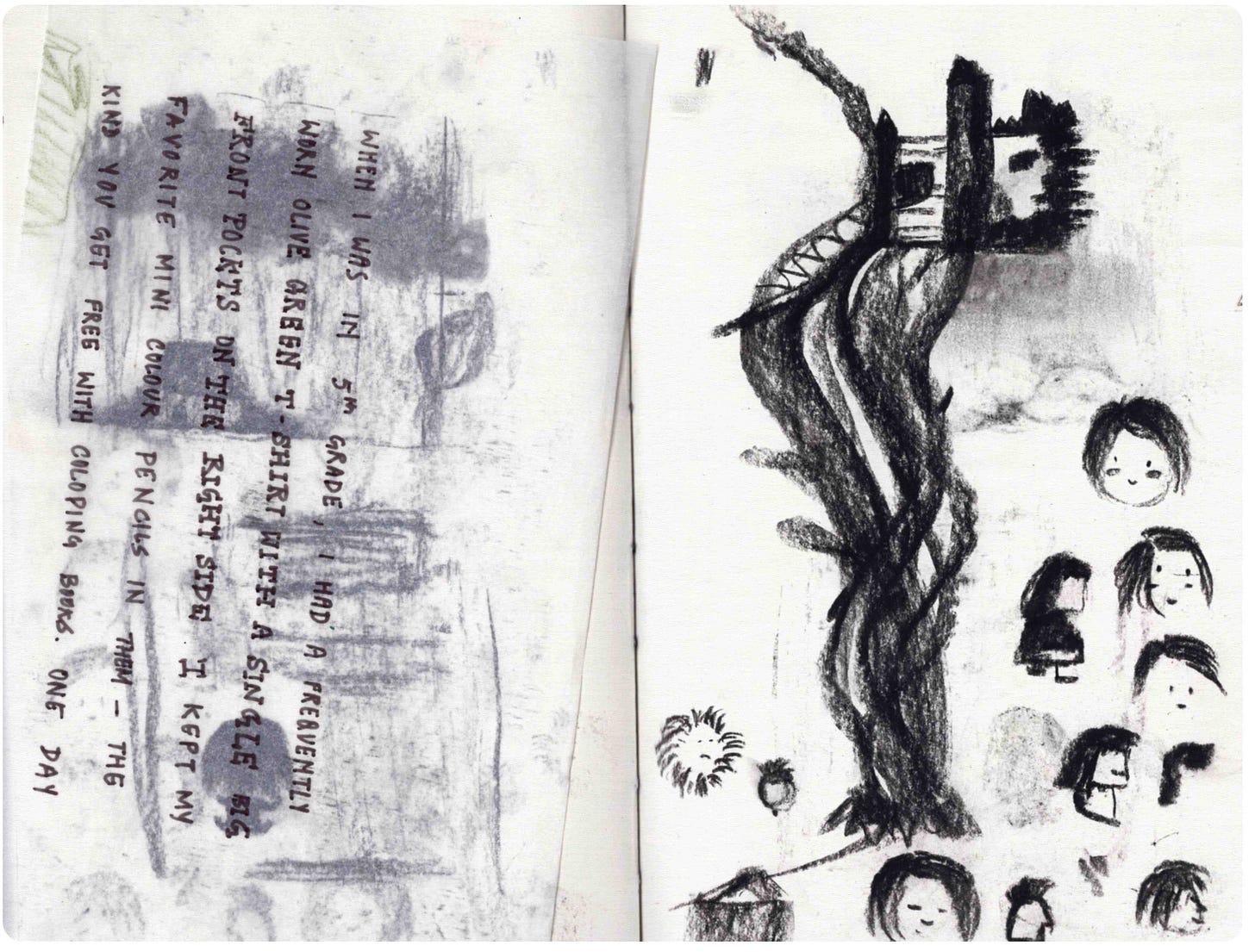
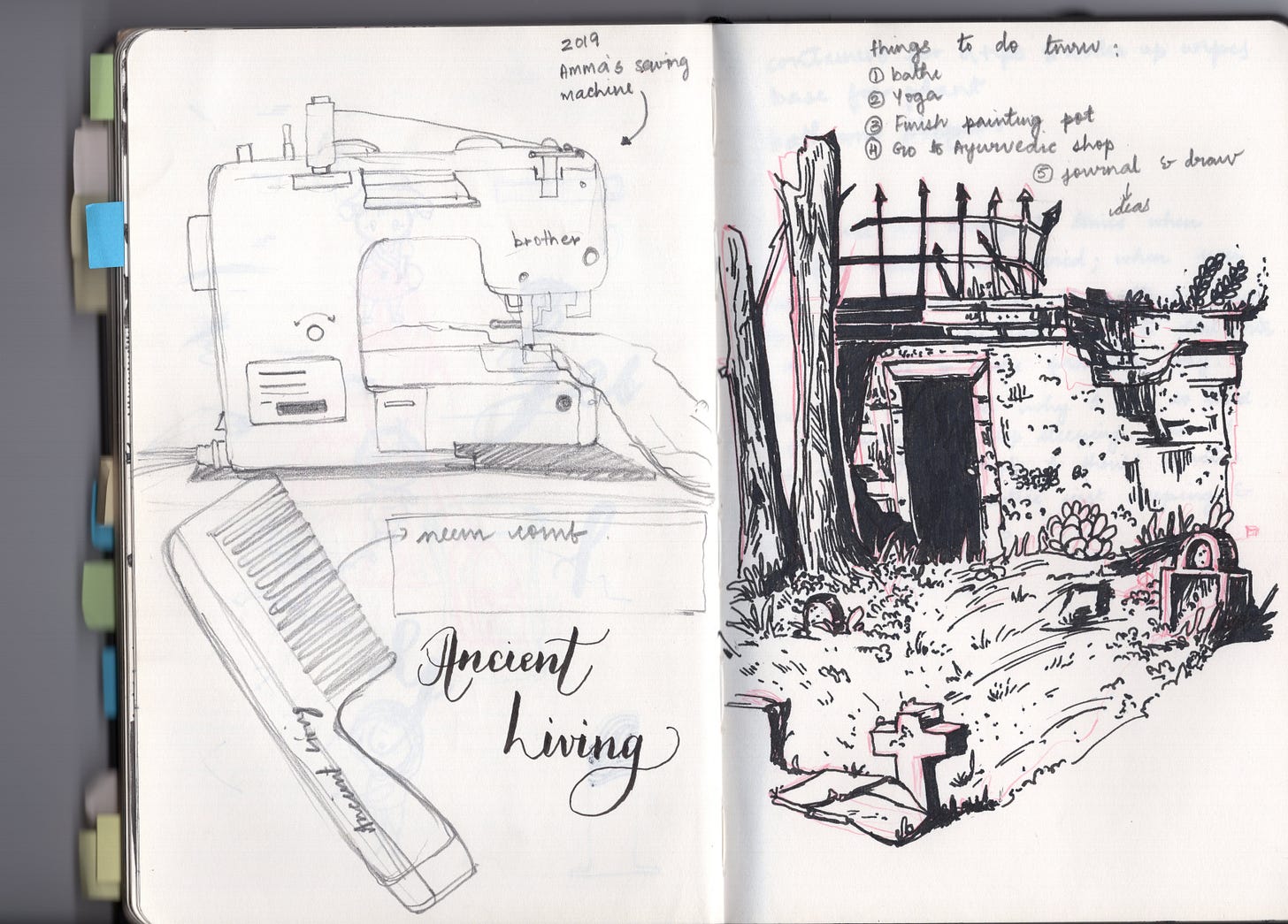
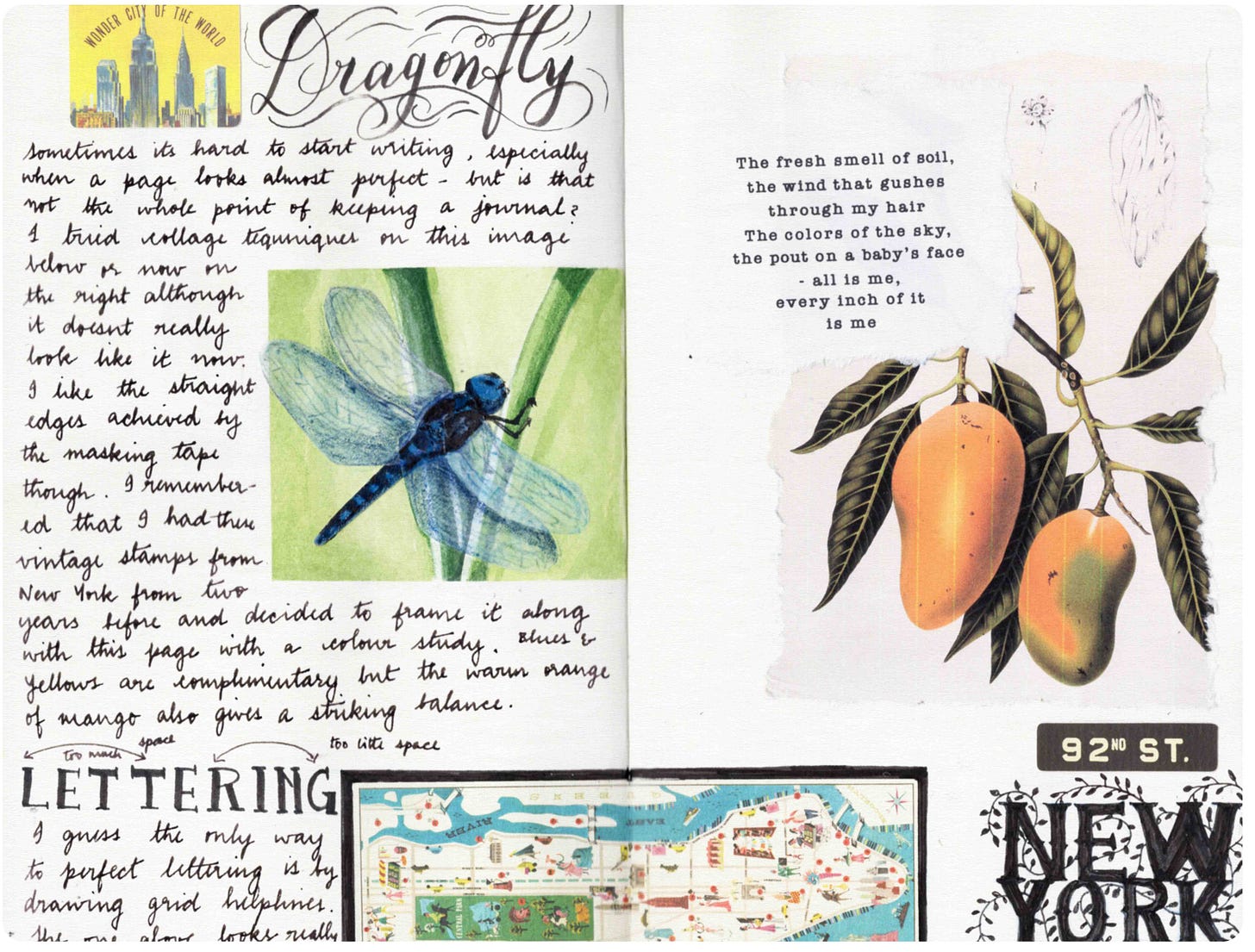
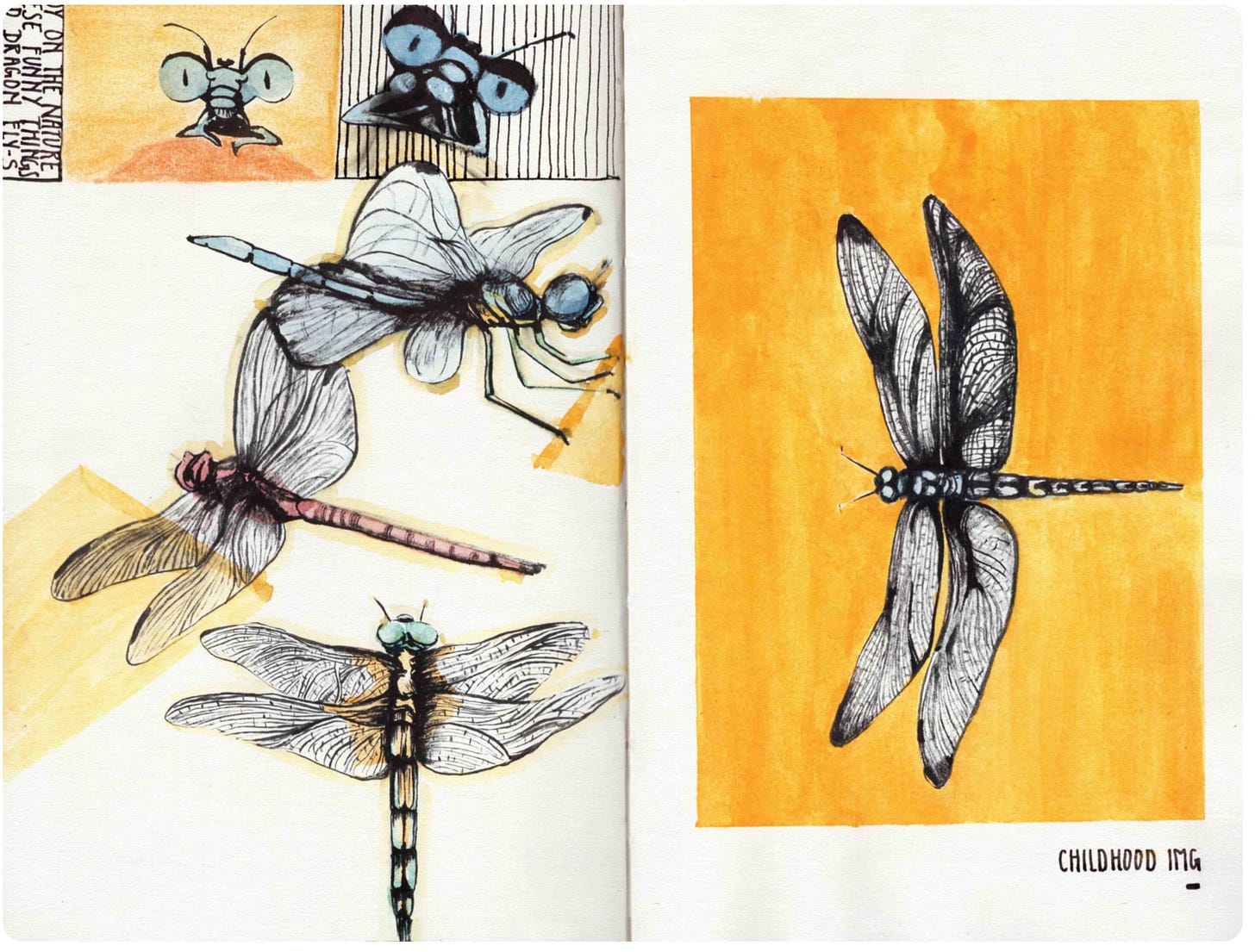
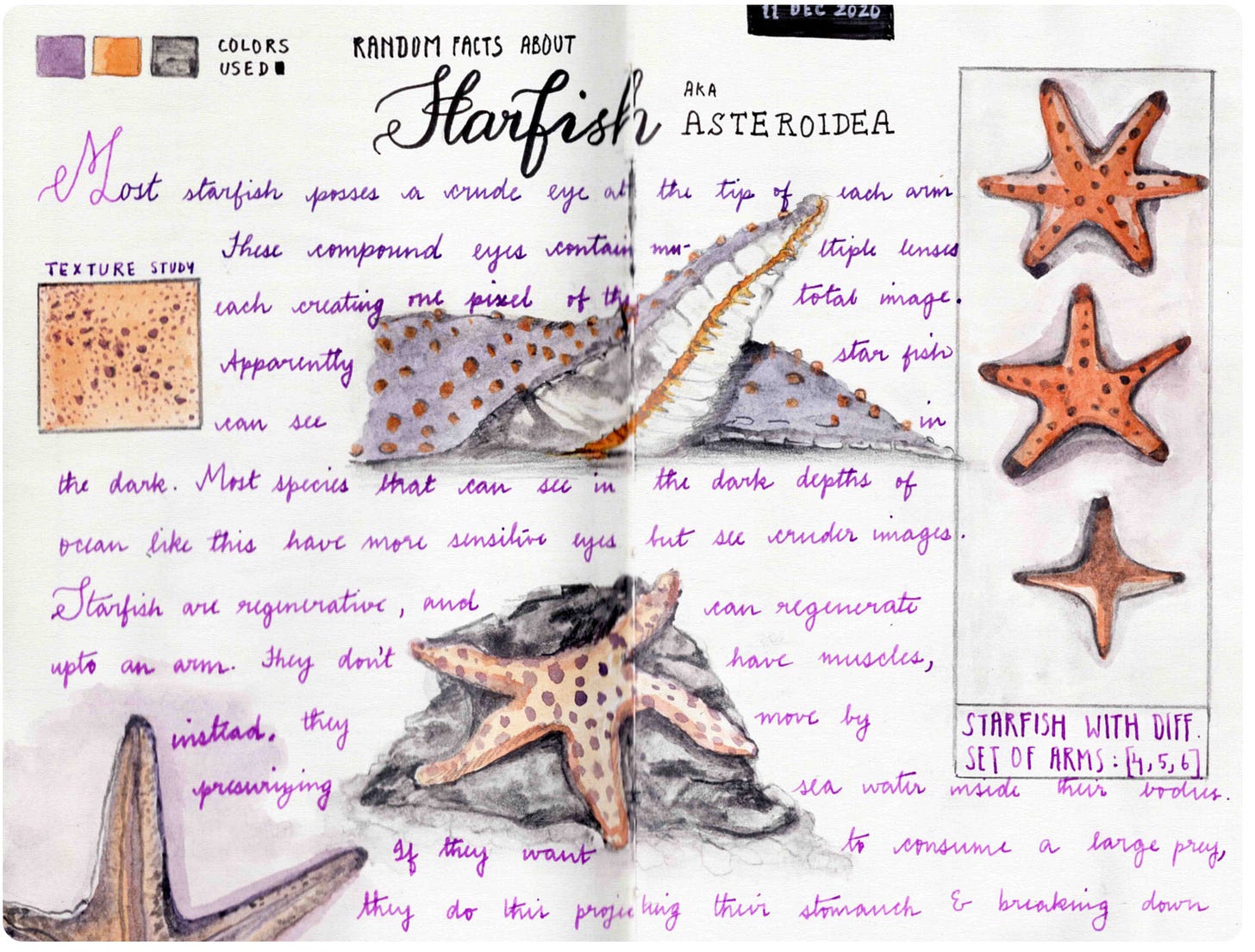



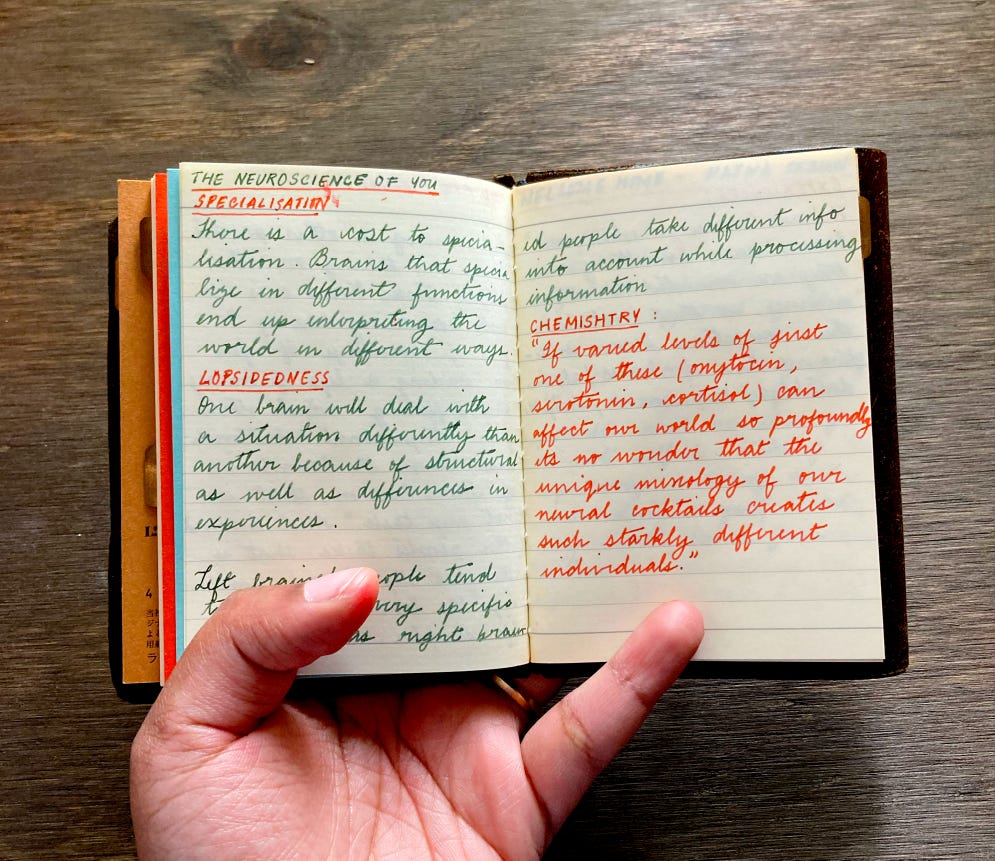



Love this! These pages are gorgeous. I love writing by hand vs. typing when I’m beginning a project. Making time for the “haptic, wholesome, away-from-the-screen experience” is so important and nourishing